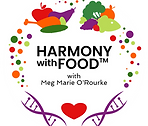Heavy Metals in Food: The Toxic Truth About What You’re Eating—and How to Protect Your Health
- Meg ORourke, RD-LDN
- Oct 22, 2025
- 3 min read
Most people assume the food supply in the U.S. is safe—but that’s not always the case. As a registered dietitian and functional nutritionist, I’ve seen firsthand how heavy metals in food like lead, arsenic, cadmium, and even mercury can accumulate silently in the body, contributing to everything from chronic fatigue and brain fog to developmental concerns in children.
These contaminants make their way into our food through polluted soil, water, and industrial activities—yet most people have no idea they’re being exposed daily. The issue isn’t just about one food or one toxin—it’s about how these elements accumulate over time, especially when your diet includes commonly contaminated staples.
Let’s break it down—and more importantly, talk about what you can do to minimize your exposure and take back control of your health.
Lead and Arsenic: The Hidden Toxins Lurking in Your Pantry
You might be shocked to learn that children’s foods—like applesauce pouches and ground cinnamon—have recently been recalled due to dangerously high lead levels. These are not isolated cases. Foods like rice, often considered a clean staple, can contain arsenic, cadmium, and other pollutants absorbed from contaminated soil and water.
⚠️ Examples of Common Exposure Sources:
Rice and rice-based products (especially from areas with poor agricultural regulations)
Cinnamon and other imported spices
Leafy greens and root vegetables grown in polluted soil
Seafood, especially large fish high in methylmercury
Why it matters: Long-term exposure to heavy metals can lead to serious health effects—from cognitive delays in infants and children to increased cancer risk, immune dysfunction, and hormonal imbalances in adults. These elements may also disrupt the gut microbiome, contributing to inflammation and mood issues.
Doctors Don’t Always Address This — But Functional Nutrition Does
Most conventional doctors receive very little training in environmental toxins or nutrition. They may not consider how heavy metals in food or nutrient depletion from processed products can lead to chronic symptoms like:
Digestive issues
Anxiety or depression
Hormonal imbalances
Fatigue and brain fog
Stubborn weight gain
This is where functional nutrition steps in. At Harmony with Food, our motto is: Test, don’t guess.
We use comprehensive testing—including heavy metal toxicity screenings, micronutrient panels, and food sensitivity tests—to uncover the root causes of your symptoms and build a plan based on real data.
How to Reduce Your Exposure to Heavy Metals in Food
You don’t have to panic—but you do need to be proactive. Here are simple, effective steps you can take to lower your intake of toxic elements:
✅ Choose Low-Contamination Rice:
Opt for California-grown rice or jasmine rice from Thailand, which tend to have lower arsenic levels. Cook rice like pasta—boiling in excess water and draining it before serving. This helps significantly reduce arsenic content.
✅ Read Labels & Buy Smarter:
Avoid foods and snacks with vague origin labels. Choose brands that test their products for contaminants or are certified for low toxin levels.
✅ Eat More Variety:
Don’t rely on the same foods every day. Diversify your diet to limit repeated exposure to the same metal-contaminated products.
✅ Get Tested Before You Supplement:
Nutrients like selenium, found in seafood and nuts, help combat oxidative stress from toxins—but too much can be harmful. Testing ensures you're getting the right amount for your body.
Natural Detox Support for a Toxic World
Your body is equipped to detoxify, but it needs the right tools. Along with testing, we recommend targeted, natural strategies to support your liver, kidneys, and gut—your frontline defense against environmental toxins.
Key support tools:
Probiotics (especially psychobiotics that also support mental health)
Matcha tea (a rich antioxidant source)
Alginates from seaweed (which may bind heavy metals and soothe reflux naturally)
Cruciferous vegetables (which aid liver detox pathways)
Fix the Gut, Fix the Brain
Your gut and brain are in constant communication. If you're struggling with mood, sleep, or concentration, it might not be "just stress." It could be a reflection of your internal environment—and toxic buildup is often part of that.
Certain probiotics have been shown to influence neurotransmitters and reduce symptoms of anxiety, depression, and brain fog. Functional nutrition takes these connections seriously, offering a personalized path to healing—not a one-size-fits-all supplement.
Take the First Step Toward Clarity
If you’ve ever felt dismissed or told “your labs look fine” while still feeling off, you're not alone. There’s a growing awareness that toxicity, poor food quality, and nutrient deficiencies are driving modern health issues—and the solution isn’t another generic protocol.
At Harmony with Food, we help clients identify what’s really going on inside their bodies—so they can take meaningful action with confidence.
Key Takeaway:
You can’t heal what you don’t measure. Stop guessing. Start testing. Learn how to protect your body from heavy metals in food and take control of your health through data-driven nutrition and functional support.
📞 Ready to get started?
Schedule your free discovery call at HarmonyWithFood.com and take the first step toward a clearer, more energetic you.





.png)























Comments